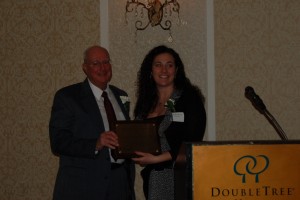Vote “Yes” to Invest in a Louisiana Infrastructure Bank
October 23rd, 2014 | By: Maria Matthews
Amend the Louisiana State Constitution on November 4 to allow the legislature to designate public funds for eligible transportation projects. This is a critical step towards establishing the Louisiana Infrastructure Bank as it creates a mechanism to allocate funds that will provide the state with safer roads and stimulate local economies. A “yes” vote on Amendment 4 will authorize the allocation of state funds to an infrastructure bank for eligible transportation projects and prompt the state legislature to take necessary steps toward the Bank’s creation. Louisiana has a severely underfunded infrastructure which has resulted in deteriorating roads and unsafe driving conditions for its residents. While this amendment would not create the infrastructure bank itself, it is the initial step toward improving road conditions. A vote in support of the infrastructure bank will ensure funds are available to improve road conditions throughout the state. When casting your vote on November 4, remember this: ✓ The current fuel tax is not keeping up with the growing costs of maintaining Louisiana’s roads. ✓ Louisiana needs a dedicated revenue stream to improve current conditions. ✓ The measure will allow the state to fund transportation project without increasing taxes or fees. ✓ Investing in infrastructure projects creates jobs and stimulates the local economy. ASCE supports the creation and operation of a state infrastructure banks. Such a bank would leverage public funds and private dollars to invest in infrastructure – transportation, water resources, environment, energy, telecommunications, and public facilities projects. The Louisiana Section of ASCE is also supportive of Amendment 4. To help Louisiana take a step in the right direction the Section has pledged their support of the “4 for the Roads” campaign. “4 for the Roads” is a movement to educate Louisiana citizens of the importance of passing Constitutional Amendment 4. Organizations driving the campaign include engineering societies, transportation associations and contractor groups. The time is now to establish a funding source to ease traffic congestion and repair the state’s roads and bridges. Vote “yes” on November 4!Tags: 2014BallotInitiatives, infrastructure, transportation
1 Comment »
Vote “For” Question 1!: Protect Maryland’s Transportation Trust Fund
October 23rd, 2014 | By: Maria Matthews
 Wisconsin voters aren’t the only ones who will be asked to decide how the state can spend its transportation dollars. On November 4, Maryland voters will also head to the polls to address this very issue.
Question 1 will appear on the ballot statewide and if passed, will ensure that revenue allocated to the Transportation Trust Fund will be used exclusively for the construction and maintenance of highways as well as related transportation purposes.
The measure offers the strongest possible protection for the Transportation Trust Fund by prohibiting future transfers to the general fund. Up to now, legislative remedies have not been enough to stem the “raiding” of Maryland’s transportation coffers. Only a constitutional amendment can ensure that major funds are available for current and future road and transit improvements.
A vote “for” provides a reliable source of transportation funding without the creation of new taxes, tolls or user fees as it hinders the diversion of Maryland’s transportation funding for non-transportation purposes. When voting, remember this:
Wisconsin voters aren’t the only ones who will be asked to decide how the state can spend its transportation dollars. On November 4, Maryland voters will also head to the polls to address this very issue.
Question 1 will appear on the ballot statewide and if passed, will ensure that revenue allocated to the Transportation Trust Fund will be used exclusively for the construction and maintenance of highways as well as related transportation purposes.
The measure offers the strongest possible protection for the Transportation Trust Fund by prohibiting future transfers to the general fund. Up to now, legislative remedies have not been enough to stem the “raiding” of Maryland’s transportation coffers. Only a constitutional amendment can ensure that major funds are available for current and future road and transit improvements.
A vote “for” provides a reliable source of transportation funding without the creation of new taxes, tolls or user fees as it hinders the diversion of Maryland’s transportation funding for non-transportation purposes. When voting, remember this:
- A “lock box” will be created ensuring funds will only be able to be used for transportation related purposes. The only override is a declared fiscal emergency and a three-fifths vote in both houses.
- You will prevent further raiding of the state’s transportation dollars. Over $1 billion has already been diverted from local transportation projects and never refunded.
- The measure will have no effect on current or future tax rates or spending levels.
- Ensuring funds are available for construction and maintenance of state and local roads will help reduce congestion, improve safety and reliability, create jobs, and boost the state’s economy.
Tags: 2014BallotInitiatives, infrastructure, transportation
1 Comment »
Protect Wisconsin’s Transportation Trust Fund — Vote “Yes” on Question 1!
October 22nd, 2014 | By: Maria Matthews
On November 4, Wisconsin voters will be asked to decide how the state can spend its transportation dollars. Question 1 will appear on the ballot statewide and if passed, will ensure that revenue allocated to the Transportation Trust Fund will not get transferred in to the state’s general fund. A vote “for” will ensure a reliable source of transportation funding without the creation of new taxes, tolls or user fees. It will also change the state of the Wisconsin Department of Transportation from a statutory agency to one provided for by the state’s constitution. Prevent the diversion of Wisconsin’s transportation funding for non-transportation purposes. When going to the polls on November 4, remember this:- A “lock box” will be created ensuring funds will be deposited into the Transportation Fund and only be able to be used for transportation-related purposes.
- All taxes and fees related to motor vehicles, aircraft, and railroads collected after December 31, 2010 would now be deposited into the Transportation Trust.
- The measure will elevate the Department of Transportation from a statutory agency to a constitutional agency.
- The measure does not create additional taxes or user fees.
Tags: 2014BallotInitiatives, infrastructure, transportation
1 Comment »
Vermont Infrastructure Shows Improvement in New Report Card
October 17th, 2014 | By: Infrastructure Report Card
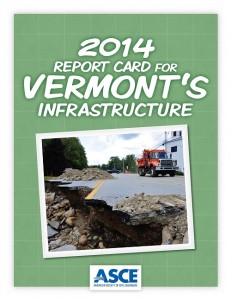 The latest Report Card for Vermont’s Infrastructure showed a slight improvement in their overall GPA to a “C.” The 2014 Report Card for Vermont’s Infrastructure is an update from 2011, when the state received a “C-” cumulative grade. The Report Card assessed bridges (C), dams (C), drinking water (C-), wastewater (D), roads (C-), and solid waste (C+).
After Tropical Storm Irene damaged the state’s infrastructure backbone in 2011, Vermont made significant investments through catch-up and emergency funding. In addition, the state’s most recent transportation funding package provided close to $700 million for transportation infrastructure, the largest transportation infrastructure investment in state history. There have also been programmatic changes. Road fatalities have been cut nearly in half since 2006 due to changes made using the Strategic Highway Safety Plan.
Led by Amanda Hanaway-Corrente, P.E. who chaired the effort and Vermont Section President-Elect Jessica Clark Louisos, P.E., the Report Card was released at a luncheon in Montpelier, which included a keynote from Sue Minter, deputy secretary at the Vermont Agency of Transportation (VTRANS) and David Mears, commissioner of the Department of Environmental Conservation.
“Vermont is poised to grow our economy as we continue to make investments into our infrastructure. The transportation funding that was signed into law in June is one example of how the state continues to focus on innovation and jobs,” said Minter.
Media coverage of the event included the Burlington Free Press and WCAX.
Read the full Vermont Report Card
The latest Report Card for Vermont’s Infrastructure showed a slight improvement in their overall GPA to a “C.” The 2014 Report Card for Vermont’s Infrastructure is an update from 2011, when the state received a “C-” cumulative grade. The Report Card assessed bridges (C), dams (C), drinking water (C-), wastewater (D), roads (C-), and solid waste (C+).
After Tropical Storm Irene damaged the state’s infrastructure backbone in 2011, Vermont made significant investments through catch-up and emergency funding. In addition, the state’s most recent transportation funding package provided close to $700 million for transportation infrastructure, the largest transportation infrastructure investment in state history. There have also been programmatic changes. Road fatalities have been cut nearly in half since 2006 due to changes made using the Strategic Highway Safety Plan.
Led by Amanda Hanaway-Corrente, P.E. who chaired the effort and Vermont Section President-Elect Jessica Clark Louisos, P.E., the Report Card was released at a luncheon in Montpelier, which included a keynote from Sue Minter, deputy secretary at the Vermont Agency of Transportation (VTRANS) and David Mears, commissioner of the Department of Environmental Conservation.
“Vermont is poised to grow our economy as we continue to make investments into our infrastructure. The transportation funding that was signed into law in June is one example of how the state continues to focus on innovation and jobs,” said Minter.
Media coverage of the event included the Burlington Free Press and WCAX.
Read the full Vermont Report Card
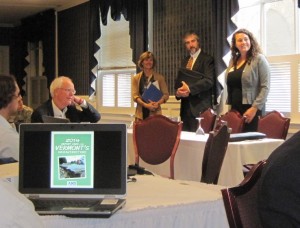
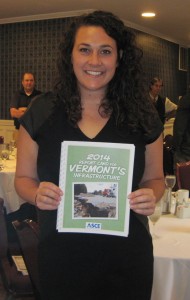
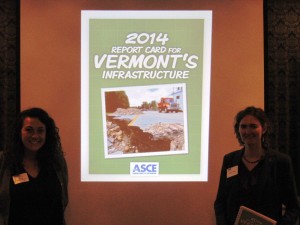
Tags: bridges, dams, grade, infrastructure, report card, roads, transportation, Vermont, wastewater, water
No Comments »
Texans Must Vote “Yes” on Designating Revenue to State Highway Fund
October 6th, 2014 | By: Maria Matthews
Texans have an opportunity to increase their state transportation funding coffers when they go to the voting booth on November 4. Proposition 1 is a statewide ballot measure that will dedicate a portion of the state’s oil and gas tax collections to the State Highway Fund. If the measure passes, $1.7 billion could be transferred to the fund in the first year alone. This would prove a significant step toward meeting the funding needs of many transportation projects. The measure, a constitutional amendment, reads as follows: “The constitutional amendment providing for the use and dedication of certain money transferred to the state highway fund to assist in the completion of transportation construction, maintenance, and rehabilitation projects, not to include toll roads.” A “yes” vote will ensure a reliable source of transportation funding without the creation of new taxes, tolls or user fees. When you talk with a neighbor about the election, remember this: ✓ Designated funds can only be used for construction, maintenance, rehabilitation, and acquiring right-of-way for public roads. ✓ If approved by voters, 50% of the money currently destined for the state’s Economic Stabilization Fund, or Rainy Day Fund, would be redirected to the State Highway Fund. ✓ The proposition also calls for the Texas Department of Transportation (TxDOT) to identify $100 million in savings to reduce long-term debt. ✓ Calls for the creation of a 10 person committee (5 State Senators, 5 State House members) to determine a “sufficient balance” for the Economic Stabilization Fund. Ultimately, voting yes is choosing to invest in mobility for Texas and a stronger economy. The measure is currently supported by the ASCE Texas Section in conjunction with the larger Move Texas Forward Coalition. Move Texas Forward is committed to improving Texas infrastructure and keeping roads capable of supporting the growth of the state. The coalition is made up of engineering societies and associations, Chambers of Commerce, transportation councils/coalitions, as well as oil and gas industry organizations. While it will not solve all of Texas’ transportation funding challenges, making funds available to the State Highway Fund is just one step in the right direction for Texas. For this reason, ASCE encourages Texans to vote “yes” on Proposition 1 in November.Tags: 2014 Election, 2014BallotInitiatives, infrastructure, transportation
4 Comments »
The Time is Now to Invest in Airports
October 2nd, 2014 | By: America's Infrastructure Report Card
Travel delays at airports have become all too common place. In fact, the surprise usually is that a flight makes it to its destination on time (or if the travel gods are feeling particularly generous, you might make it to your destination a few minutes early). Some of this is beyond anyone’s control: weather patterns and airplane mechanical problems to name a few. But part of this problem is most certainly self-imposed. Inadequate investment in the nation’s aviation system has real consequences, beyond simply making you a few minutes late for check-in at your arriving hotel. In ASCE’s 2013 Report Card for America’s Infrastructure the Society gave a grade of “D” to the aviation sector. Our Failure to Act report highlights the sobering reality that this lack of aviation sector investment has on the broader U.S. economy: a projected $313 billion in loss of GDP by 2020 and 350,000 fewer jobs throughout the economy by 2020. The Society’s dedication to this issue does not stop with economic reports, but rather this data is the gateway to engaging elected officials to act on solutions to these problems. That is why ASCE recently joined with aviation sector stakeholders, such as airports and state legislators, to supports an increase in the passenger facility charge (PFC) cap which would allow airports to raise necessary funds locally for improving the nation’s aviation infrastructure. Funds raised through PFCs are only eligible for use at the airport in which they were collected and can be used on projects to preserve or enhance the safety, security and capacity of the national air transportation system. This funding solution is expected to be under consideration when Congress turns its attention crafting to a broader Federal Aviation Authorization (FAA) reform bill early next year. Until then, you can show support for an improved aviation system by writing your Members of Congress here and using the hashtag #AirportsUnited to help spread the message. It’s time to take human error related to political gridlock out of the equation when it comes to getting travelers to their destinations safely, on-time and hopefully with a little less stress.Tags: Airports, aviation, infrastructure, transportation
1 Comment »
Maximizing the Investment in Transportation Projects
October 1st, 2014 | By: Becky Moylan
ASCE teamed with the Eno Center for Transportation to author Maximizing the Value of Investments Using Life Cycle Cost Analysis. The report, released yesterday at a Capitol Hill briefing, surveyed industry practitioners and policymakers on their current use of life cycle cost analysis (LCCA), and their beliefs on what role it should play in the decision-making process. It also features six case studies that demonstrate the benefits of implementing LCCA. While almost all those surveyed said it should be part of the process, only 59% said it was currently being used.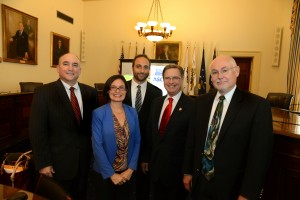
Greg Nadeau, Beth Osborne, Joshua Schank (Eno), Pat Natale (ASCE), and Chris Stone all offered their perspectives on the value of LCCA. Photo by Neshan H. Naltchayan
Tags: infrastructure investment, LCCA, life cycle cost analysis, life cycle costs, surface transportation, transportation
1 Comment »
State Legislators Invited to Dream Big!
September 23rd, 2014 | By: Becky Moylan
Last week, ASCE hosted state legislators from nine states at the Washington office as part of a Council of State Governments (CSG) Transportation Policy Academy. ASCE has been a regular sponsor of these forums that bring state legislative leaders together to discuss transportation issues and the challenges they are facing in their respective states. In addition to a presentation on the 2013 Report Card for America’s Infrastructure, the event also featured a luncheon presentation on plans for an IMAX movie Dream Big!, which ASCE and the ASCE Foundation are pursuing to put engineering dramatically in the public eye. Lawmakers from Georgia, Hawaii, Kentucky, Nebraska, New Hampshire, North Carolina, South Dakota, Vermont and Washington were in attendance.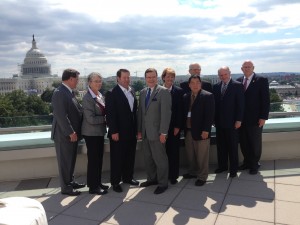
State Legislators visit ASCE’s Washington office during the recent CSG Policy Academy. L-R: Rep. Curtis King (R-Washington), Rep. Patricia Higgins (D-New Hampshire), Rep. Jay Roberts (R-Georgia), Sen. Mike Vehle (R-South Dakota), Rep. Diane Lanpher (D-Vermont), Rep. Ryan Yamane (D-Hawaii), Sen. Ernie Harris (R-Kentucky), Sen. Jim Smith (NP-Nebraska), Rep. William Brawley (R-North Carolina)
Tags: CSG, dream big, state government, transportation
No Comments »
ASCE Members Participate in White House Summit on Infrastructure Investment
September 11th, 2014 | By: America's Infrastructure Report Card
As a part of what the White House has deemed its “Year of Action” campaign to move policy ideas and initiatives forward in the face of Congressional gridlock, the Obama Administration recently held an Infrastructure Investment Summit aimed at soliciting ideas on how to better leverage available financing to deliver projects in the transportation, water, telecommunications and energy sectors. Participants included cabinet secretaries from the departments of Treasury, Transportation and Commerce as well as leaders from industry, finance, philanthropy and state and local government. Two ASCE members, Anthony Bartolomeo, P.E., F.ASCE who is chairman of the Society’s Industry Leaders Council and Robert Victor, P.E., F.ASCE who chairs ASCE’s Committee on America’s Infrastructure which produced the Society’s national Infrastructure Report Card, participated in the day-long summit with Bartolomeo moderating a small breakout session with Treasury Secretary Jack Lew and Transportation Secretary Anthony Foxx in attendance. The goal of the meeting was to identify barriers to accelerating private investment in the US infrastructure network and develop strategies to further deploy the billions of domestic and foreign dollars currently sitting on the sidelines. The summit will inform an interagency report on the topic which is due for delivery to President Obama on November 14, 2014.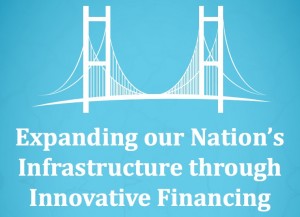 Using the summit as a platform for announcement, the U.S. Department of Transportation (USDOT) declared a $950 million TIFIA loan would be provided for the Orlando, Florida Interstate 4 highway project, which signifies the biggest TIFIA loan to date for a public private partnership (P3). USDOT also announced that it had cleared efforts by Pennsylvania DOT to utilize a $1.2 billion private activity bond allocation to replace more than 500 small bridges within a P3 arrangement. USDOT has recently launched the Build America Transportation Investment Center which released at the summit model P3 contract provisions in order to better assist project sponsors with the guidance and technical assistance necessary to complete highway toll concession arrangements. The topic of P3s is certain to receive further attention in the weeks ahead as the U.S. House of Representatives Committee on Transportation & Infrastructure is slated to release a bipartisan report on the topic which will inform their work on accelerating private sector investment in infrastructure.
Using the summit as a platform for announcement, the U.S. Department of Transportation (USDOT) declared a $950 million TIFIA loan would be provided for the Orlando, Florida Interstate 4 highway project, which signifies the biggest TIFIA loan to date for a public private partnership (P3). USDOT also announced that it had cleared efforts by Pennsylvania DOT to utilize a $1.2 billion private activity bond allocation to replace more than 500 small bridges within a P3 arrangement. USDOT has recently launched the Build America Transportation Investment Center which released at the summit model P3 contract provisions in order to better assist project sponsors with the guidance and technical assistance necessary to complete highway toll concession arrangements. The topic of P3s is certain to receive further attention in the weeks ahead as the U.S. House of Representatives Committee on Transportation & Infrastructure is slated to release a bipartisan report on the topic which will inform their work on accelerating private sector investment in infrastructure.
Tags: financing, infrastructure, Obama Administration, transportation
No Comments »



 */ ?>
*/ ?>




